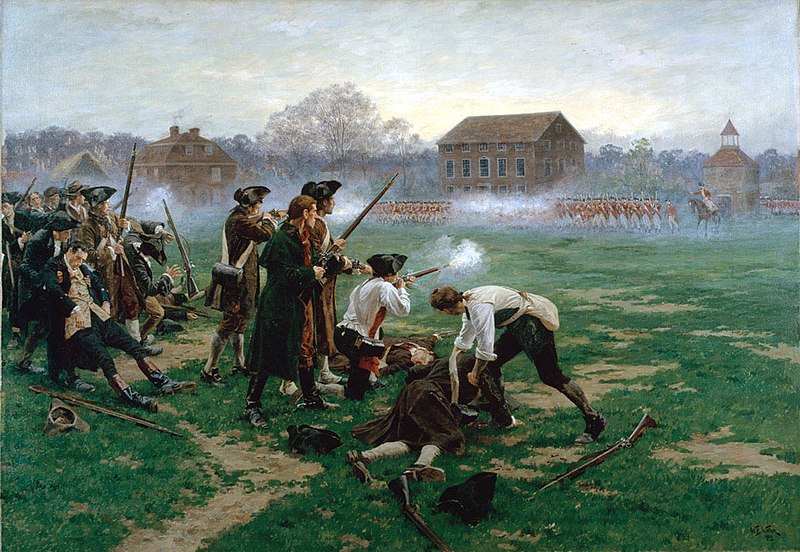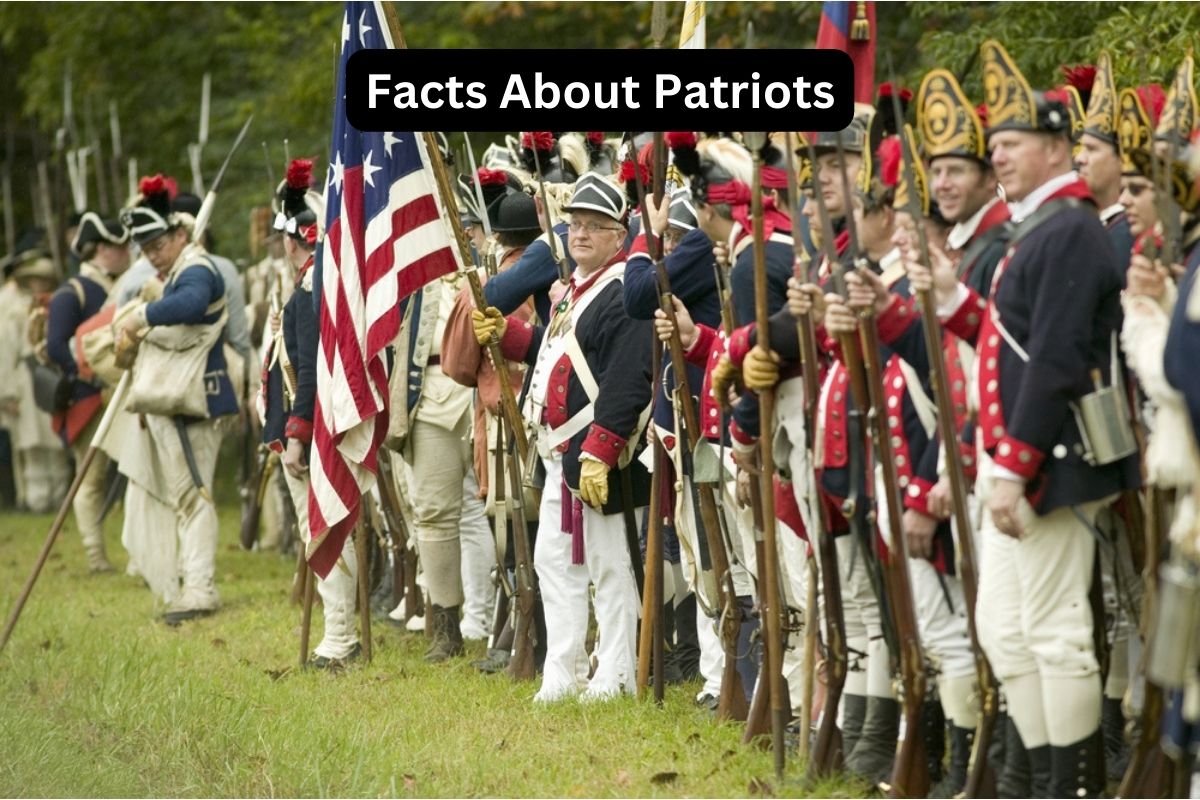The Patriots of the Revolutionary War were impassioned colonists who championed the cause of American independence from British rule in the late 18th century.
Their unwavering commitment to principles like self-governance, opposition to taxation without representation, and the pursuit of liberty reshaped the course of history, leading to iconic events like the Boston Tea Party and the adoption of the Declaration of Independence.
Through their sacrifices and resilience during the Revolutionary War, they laid the groundwork for the birth of the United States as a sovereign nation, leaving a lasting legacy of freedom and democracy.
Patriots Facts
1. Patriots supported the American Revolution for independence
These Patriots were individuals who ardently supported the American Revolution, a tumultuous period that sought to break the shackles of British colonial domination.
What set them apart was their unwavering belief in the idea that the American colonies should govern themselves and determine their own destiny. This fervent desire for self-determination and the pursuit of liberty were the driving forces behind their actions.

2. Their motivations included self-governance and opposition to British taxation
At the heart of the Patriot movement was a profound yearning for self-governance. They believed that the people living in the American colonies should have the right to shape their own laws, institutions, and future, free from the dictates of a distant British monarchy.
This belief in self-sovereignty was deeply rooted in their collective consciousness.
Additionally, their opposition to British taxation played a central role in galvanizing their resolve. The British Crown had imposed a series of taxes on the American colonies without granting them representation in the British Parliament.
The Patriots staunchly rejected this “taxation without representation” and saw it as a direct infringement on their rights and freedoms. This opposition fueled protests, culminating in iconic events like the Boston Tea Party, where Patriots defiantly dumped British tea into Boston Harbor in protest of the Tea Act.
3. Key Patriot leaders included George Washington and Thomas Jefferson
George Washington, with his unshakable resolve and strategic leadership, emerged as a central figure among the Patriots. His appointment as the Commander-in-Chief of the Continental Army was a pivotal moment in the American Revolution.
Washington’s ability to lead and inspire troops through the harshest of circumstances, such as the challenging winter at Valley Forge, earned him the admiration and trust of the Patriot cause.
Thomas Jefferson, a visionary statesman and eloquent writer, left an indelible mark on the American Revolution. His authorship of the Declaration of Independence in 1776 crystallized the ideals and principles that underpinned the Patriot movement.

In this remarkable document, Jefferson articulated the reasons for seeking independence and the belief in inalienable rights, including life, liberty, and the pursuit of happiness. His words continue to resonate as a testament to the enduring values of the United States.
These Patriots, united by their unwavering dedication to liberty and self-governance, embarked on a tumultuous journey that ultimately led to the birth of the United States as a sovereign and independent nation. Their sacrifices and determination laid the foundation for the democratic principles and freedoms that define the nation to this day.
4. The Boston Tea Party was a Patriot-led protest in 1773
The Boston Tea Party stands as a seminal event in the lead-up to the American Revolution, and it was orchestrated by the Patriots.
In 1773, as a protest against the British-imposed Tea Act, a group of Patriots disguised themselves as Mohawk Indians and boarded British ships in Boston Harbor. They proceeded to throw an entire shipment of tea, belonging to the British East India Company, overboard.
This act of defiance was a direct response to the Tea Act, which granted the British East India Company a monopoly on tea sales in the American colonies and imposed a tax on tea.
The Boston Tea Party sent a clear message that the Patriots would not tolerate taxation without representation, and it served as a catalyst for further acts of resistance against British rule.
5. The Declaration of Independence was adopted in 1776
One of the most iconic documents in American history, the Declaration of Independence was adopted by the Continental Congress on July 4, 1776.
It was primarily drafted by Thomas Jefferson, with input from others, including John Adams and Benjamin Franklin. The declaration eloquently outlined the reasons for the American colonies’ separation from British rule.
It affirmed the principles of equality, liberty, and the unalienable rights of life, liberty, and the pursuit of happiness.
The Declaration of Independence was not only a declaration of intent but also a defining statement of the values that would shape the emerging nation. It remains a symbol of American identity and a source of inspiration for freedom-loving people worldwide.
6. The Revolutionary War lasted from 1775 to 1783
The American Revolution was a protracted conflict that spanned eight years, from 1775 to 1783. Patriots played a central role in this war, which involved battles, skirmishes, and campaigns throughout the American colonies.
Key battles included Lexington and Concord, Bunker Hill, Saratoga, and the decisive Battle of Yorktown.

The Patriots’ determination and resilience were evident during the harsh winter at Valley Forge, where they endured immense suffering and emerged as a more disciplined and unified force.
The Revolutionary War also witnessed significant international developments. The Patriots secured a crucial alliance with France in 1778, which brought much-needed military and financial support.
French naval forces played a pivotal role in the American victory at the Battle of Yorktown in 1781, which effectively ended the war.
The Treaty of Paris in 1783 officially ended the Revolutionary War and recognized the United States as an independent nation, marking the culmination of the Patriots’ efforts and their successful struggle for self-determination.
7. Patriots secured a crucial alliance with France in 1778
The alliance with France was a turning point for the Patriots during the Revolutionary War. In 1778, the Treaty of Alliance was signed, formalizing a military and political partnership between the United States and France.
France’s support, both in terms of military assistance and financial aid, proved instrumental to the Patriot cause.
French troops, commanded by General Rochambeau, joined forces with American forces, contributing significantly to the success of the Patriots.
The French navy, under Admiral de Grasse, played a crucial role in the decisive Battle of Yorktown in 1781, where British General Cornwallis surrendered, effectively ending the war.
The French alliance demonstrated the international recognition of the United States as a legitimate nation and underscored the Patriots’ commitment to their cause.
8. Valley Forge was a challenging winter encampment
Valley Forge was a defining moment in the Patriots’ struggle for independence. During the harsh winter of 1777-1778, George Washington’s Continental Army faced extreme hardships while encamped at Valley Forge, Pennsylvania.
The soldiers endured severe cold, starvation, disease, and a lack of proper clothing and shelter. Despite these daunting challenges, Washington and his officers used this period to train and discipline the army.
The experience at Valley Forge forged a resilient and more disciplined Continental Army. It also showcased the unwavering commitment of the Patriots to their cause, as they endured tremendous suffering in their quest for freedom. By spring, when they emerged from Valley Forge, they were better prepared to face the British in the field.
9. The Treaty of Paris (1783) ended the war and recognized the U.S
The Treaty of Paris, signed in 1783, marked the official end of the Revolutionary War. Negotiated by American diplomats John Adams, John Jay, and Benjamin Franklin, along with representatives of Great Britain and France, the treaty recognized the independence of the United States.
It established the boundaries of the new nation, extending from the Atlantic Ocean to the Mississippi River and from Canada to Florida.
The treaty also addressed important issues, such as the withdrawal of British troops from American territory, the return of American prisoners of war, and the restoration of property to loyalists.
Importantly, it acknowledged the United States as a sovereign nation on the world stage, solidifying the Patriots’ hard-fought victory and their determination to create a new nation based on principles of democracy and self-governance.
10. The Patriots’ legacy includes the founding of the United States
The legacy of the Patriots of the Revolutionary War is profound and enduring. Their sacrifices, dedication, and commitment to the principles of liberty, democracy, and self-determination laid the foundation for the United States of America.
The ideals expressed in the Declaration of Independence, including the belief in individual rights and the pursuit of happiness, continue to shape the nation’s identity and inform its governance.
The Patriots’ legacy extends beyond the founding era. Their example of resilience in the face of adversity, their willingness to fight for their beliefs, and their commitment to democratic principles continue to inspire generations of Americans and serve as a symbol of the nation’s enduring spirit.
In many ways, the Patriots of the Revolutionary War exemplify the core values that have defined the United States throughout its history and continue to shape its aspirations for the future. Their quest for independence, liberty, and self-governance remains an integral part of the American story.
